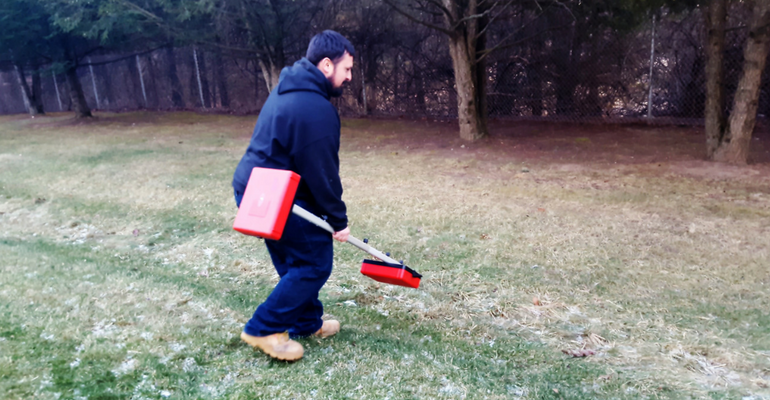Oil Tank Sweeps: 8 Tips on Choosing the Right Inspector

When buying a home, there are so many inspections to perform on the visible parts of the home. Everyone worries about structures, soffits, chimneys, swimming pools, etc. But one thing a lot of buyers don’t think about is what’s hidden underground on their new property. And what’s hidden underground can cost thousands of dollars to a new homeowner if it’s not caught during the inspection process.
Hidden underground oil tanks can be a major financial liability when buying a home and even if no signs point to a home ever having had an underground oil tank, a tank sweep of the property is recommended, especially in older homes. For minimal cost, a oil tank sweep can potentially save thousands upon thousands of dollars in soil clean up if a previously undisclosed heating oil tank is discovered during the sweep.
So what should you look for when choosing an environmental testing company for this service? Here are a few things to consider:
1. Guarantee
This is so very important. Make sure the company performing the tank sweep guarantees the inspection. Many companies verbally state that they guarantee the tank sweep findings when they’re trying to close the sale then put specific wording in their report releasing them of any liability, such as:
A) “Company A” is not responsible for same or for underground storage tanks that cannot be detected by the above methods or because of site conditions.
B) 99% Guarantee or efficiency in finding hidden oil tanks: Will your potential new home be the 1% the tank sweep inspector doesn’t guarantee or isn’t efficient at finding tanks at?
2. Gimmicks & Potentially False Statements
Some claim drones, animals and other non-detection equipment can detect tanks and piping associated to tanks. These are not tried and true methods of detection and we have to ask ourselves, how to do you know if a detection animal is doing his/her job efficiently? If a detection animal doesn’t show any indication of detecting an underground oil tank, for instance, under a low lying deck, does the inspection contractor guarantee that there is no tank there?
3. Experience
This is very important and not just the amount of time they’ve been performing these inspection but also the quality of inspections they’ve performed within that time. You want technicians who have been extensively trained to detect underground oil tanks as well as technicians who have been trained to fully understand the limitations of the equipment. What questions should you ask them in reference to their experience? Here are a few:
A) How long have they been performing tank sweeps?
B) How long have they been in business? If they’ve been performing sweeps for a long time, you may want to ask them how many tanks they’ve missed in their time of performing these inspections. This is important, as many times new companies are comprised of employees previously released from existing companies due to a high level of missed tanks / claims or improper conduct on job sites.
C) What do they consider obstructions? This, we’ll cover in the next part.
4. Obstructions
Every type of inspection, from tank sweeps to septic inspections, has its limitations, even minor. For tank sweeps, the biggest limitation would be obstructions. Obstructions are areas of a property that either prevent or interfere with the detection equipment/magnetometer. This is, unfortunately, common and obstructions should be clearly listed on all reports. If you contract a company that never lists obstructions on a property or finds a tank, you may want to look elsewhere. They’re common and you should be aware of the areas that could not be scanned on the property you’re purchasing. Some common obstructions would be:
A) Air Conditioning Units
B) Bilco Doors
C) Concrete walkways or patios that contain rebar / metallic reinforcement
D) Fences
See, you have to look at the equipment used to perform tank sweeps as, to simplify it, industrial grade metal detectors. Yes, sort of like the ones you use at the beach, but more effective with greater detection capability including higher sensitivity and greater depth detection. However, with any magnetometer, it cannot be used to scan for metal object located under other metal objects. Common sense, right? Not always, we’ve run across many inspectors that never list obstructions or “ignore” some obstructions, leaving many missed tanks in their wake.
5. Recommendations
Service after the inspection is key. Make sure the company will walk you through the next steps in the tank sweep process after you receive the report. There are different options depending upon what the inspector finds on site so request that they put these options right in the report for all parties involved in the transaction to review upon receipt.
6. Certifications
If an inspector claims they are “Certified” to perform oil tanks sweeps or they provide “Certified” reports, this may not be true. In most states, there is no certification or license required to perform tanks sweeps so you’re relying on experience and background alone when choosing an inspector. Also, because oil tank sweeps are typically not regulated, the report requires no regulatory format either. When it comes to reporting, the written guarantee, as discussed above, is imperative.
7. Insurance
Make sure the company you’re hiring is fully insured. Ask for proof of their liability insurance and make sure their company name is listed on the certificate.
8. Price Point
This is where it gets tricky. Many of the newer companies popping up will drop prices to a near unprofitable level. They do this to get as many tank sweeps as they possibly can and to damage competition. Anyone in business can understand this approach and even the average consumer looks at this as a benefit for them. This approach works great when it comes to most consumer items however, it may not be a good sign when it comes to inspections. You want to make sure the company you’re dealing with has the capital to cover claims that may arise, and may even arise on your property or the property you purchase.
Now you’re an expert on choosing your tank sweep inspector and you understand the landmines in choosing the wrong inspector! Remember, the difference between a good inspector and a bad inspector, even the slightest, could cost you thousands.





